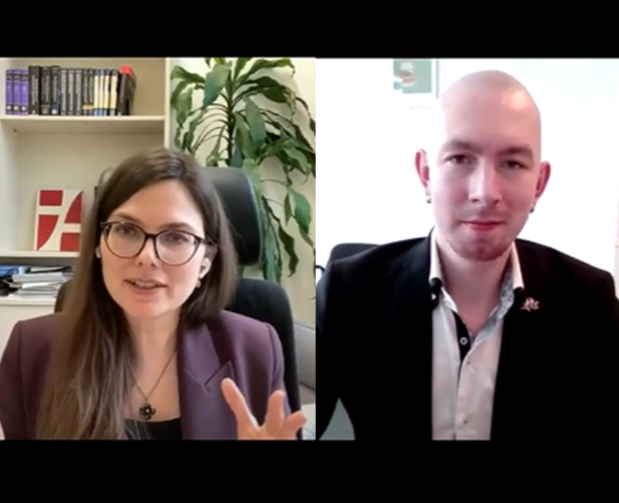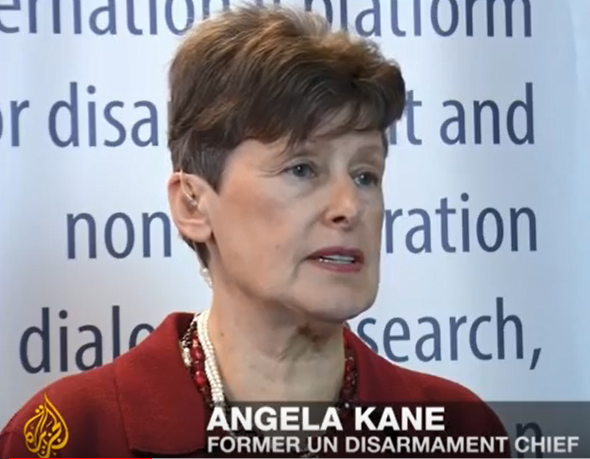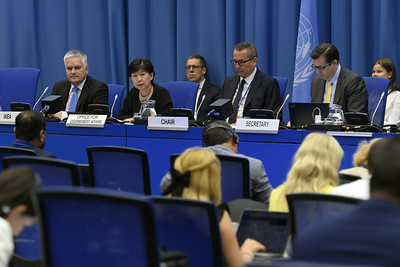
The VCDNP hosted Dr. Elisabeth Röhrlich for a presentation of her book Inspectors for Peace: A History of the International Atomic Energy Agency. Largely informed by extensive research in the Archives of the International Atomic Energy Agency (IAEA), Inspectors for Peace is the first comprehensive, independent study of the Agency’s history. Starting with US President Eisenhower’s famous ‘Atoms for Peace’ speech in 1953, the book examines why and how the IAEA was created, how its mandate has evolved, and the ways it has dealt with momentous challenges. Inspectors for Peace unpacks many fascinating yet little‑known stories that illustrate why the IAEA and its safeguards system have been indispensable for protecting international security for over 60 years.
Inspectors for Peace was published by Johns Hopkins University Press in April 2022. The event was held on 30 March 2023, moderated by VCDNP Research Associate Noah Mayhew.

Dr. Röhrlich started her presentation by exploring the difficult circumstances of the IAEA’s creation. It was established within four years of President Eisenhower’s speech and amid grave international tensions, including the space race, the Suez Crisis, and the 1956 Hungarian Revolution. She noted that negotiations were characterised by conflict between the Global North and South even more than between East and West. At that time, many newly independent states found international safeguards to be reminiscent of the imperial paternalism they had just freed themselves from.
Indeed, nuclear safeguards were the less prominent part of the IAEA’s dual mandate. With technical assistance in the foreground, the Agency’s safeguards team started out small and was restrained in its activities by political compromises between the nuclear haves and have nots. As a general learning about the IAEA’s track record, Dr. Röhrlich emphasised that its action or inaction have usually been determined by political decisions by its Member States, by what was politically possible at the time, and only rarely by a lack of awareness or ability.
Today’s model of comprehensive nuclear safeguards was only introduced with the Treaty on the Non‑Proliferation of Nuclear Weapons (NPT) – a momentous shift from before, when safeguards referred to preventing the diversion of nuclear material and technology provided under technical assistance by States or the IAEA and only covered individual items specified in the safeguards agreements. This is illustrated by the Agency’s absence from negotiations towards the NPT. With several influential IAEA Member States opposing the Treaty, the Agency was eager to demonstrate that it was not a non-proliferation agency, but merely carrying out the mandate received through Article III of the Treaty. As an expression of this, the guidelines for the structure and content of comprehensive safeguards agreements, published as INFCRIC/153 in 1972, contain a softer version of the IAEA’s non-proliferation mandate – that is to detect and deter diversion for weaponization, rather than definitively preventing the spread of nuclear weapons.
In the discussion with the audience, Dr. Röhrlich spoke about allegations of the IAEA’s politicisation, the famous “Vienna spirit”, and how leadership styles have influenced in which issues the IAEA gets involved and how it positions itself.
An Associate Professor at the Department of History of the University of Vienna, Dr. Röhrlich has dedicated over a decade of research to illuminating the IAEA’s history, promoting a deeper understanding of its creation and evolution. Starting in 2011, she led the now completed IAEA History Research Project, investigating how the Agency’s function and organisational identity have changed across more than 60 years. To document the Agency’s oral history, Dr. Röhrlich conducted interviews with numerous eminent persons from the IAEA’s past, including former Director Generals Hans Blix and Mohamed ElBaradei. These interviews are available online.
The full recording is available below.

